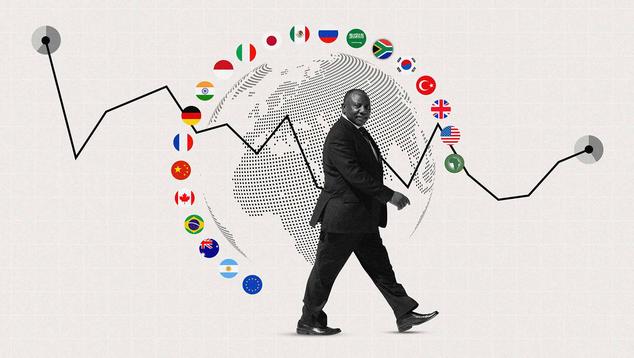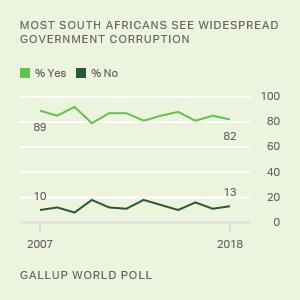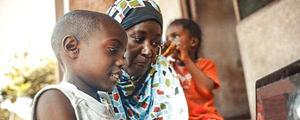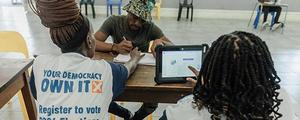WASHINGTON, D.C. — As South Africa concludes its presidency of the Group of 20 (G20) with the first summit ever held in Africa on Saturday, the country takes the global stage bolstered by renewed confidence at home. Forty-one percent of South Africans now approve of their country's leadership, up from 29% in 2022, one of the lowest readings on record.
While South Africa has long been regarded as a continental power, with the highest GDP in Africa, its G20 presidency has elevated its global profile and offered a chance to shape how African priorities are represented in international policymaking. The role has placed the country at the center of trade, governance and equitable growth discussions among the world’s largest economies.
South Africans’ latest views on their leadership come as the country has transitioned into a coalition era after the 2024 elections, which ended three decades of single-party dominance by the African National Congress. President Cyril Ramaphosa now governs primarily in partnership with the main opposition party, the centrist Democratic Alliance.
The survey results show modest improvements in perceptions of leadership performance, though South Africans continue to voice concerns about corruption and the pace of reform and have grown less approving of the leadership of the U.S., which will assume the G20 presidency when South Africa’s term ends next month.
Addressing Corruption Remains a Major Priority
Fighting corruption has been a defining theme of South Africa’s G20 presidency. As chair of the G20’s Anti-Corruption Working Group, the country has emphasized transparency and accountability — issues that have long been top of mind for many South Africans.
According to Gallup’s most recent World Poll, nearly eight in 10 South Africans say corruption is widespread in government, and a similar percentage say the same about business. These perceptions have remained elevated for much of the past two decades and continue to exceed both the African and global averages, as measured in 2024.
Despite this long-standing challenge, there are signs that efforts may be moving public opinion in the right direction. Perceptions of corruption in government, which reached 89% in 2022, have declined year over year to 77% in 2025. Views of corruption as widespread within business have also fallen, from 88% in 2022 to 75% today.
South Africans See Progress on Sustainability Efforts
Sustainability has been a major theme in recent G20 summits, including those held in Brazil, India and Indonesia. South Africa is no different, making climate change and environmental protections a key focus of its term, including a particular focus on combating predatory mining that is widespread throughout southern Africa.
At home, South Africans are feeling more upbeat on sustainability efforts within their own country, with 47% now saying they are satisfied with efforts to preserve the environment — an increase of seven percentage points from last year and a nine-year high. This puts South Africa nearly on par with the G20 median of 48% in 2024, yet still below the global median of 56% that year.
Relations With the U.S. Will Play a Major Role in the Future
South Africa’s future direction, in its global role and its domestic outlook, will depend partly on its relationship with the United States, which is set to assume the G20 presidency on Dec. 1, at the conclusion of South Africa’s term.
Relations between the two countries have been strained this year, with the U.S. halting all aid to the country in February. South Africa was also the target of 30% tariffs this August, outpacing the 15% applied on neighboring countries like Lesotho and Zimbabwe.
Given that the U.S. is South Africa’s second-largest trading partner, the steep tariffs have had a chilling effect on exports of agricultural products — including wine, where the U.S. is a major market. The imposition of tariffs serves as another headwind against the South African economy and is a sharp reversal from the strong trade relations the two countries have enjoyed under the African Growth and Opportunity Act, which the U.S. implemented in 2000.
This difficult period has coincided with a sharp decline in South Africans’ approval of U.S. leadership. Gallup data show that approval peaked at 92% in 2010 during President Barack Obama’s first term and has fallen to 34% in 2025, tied with 2019 for the lowest level recorded.
Implications
South Africa’s engagement in the G20 carries significant implications for both domestic policy and global governance. As the only African nation of the forum (the African Union is a member as a regional organization), its stance influences how emerging markets and developing nations are represented in multilateral decision-making. Domestically, successful leadership by Ramaphosa and the coalition government could help accelerate reforms on governance and against corruption, issues central to its G20 agenda.
South Africa’s G20 presidency has buoyed hopes that it could redefine Africa’s role in global governance, setting the stage for deeper cooperation among the major economies on trade and anti-corruption efforts. Yet as its term concludes, concerns that the country will be able to maintain this momentum persist, particularly in the face of strong economic hurdles brought on by its fractious relationship with the U.S. How South Africa manages this diplomatic impasse will determine whether the nation is able to translate its G20 leadership into long-lasting change.
Stay up to date with the latest insights by following @Gallup on X and on Instagram.
For complete methodology and specific survey dates, please review Gallup's Country Data Set details. Learn more about how the Gallup World Poll works.




